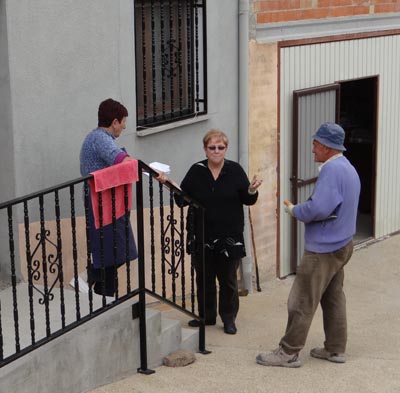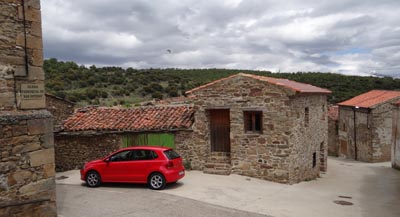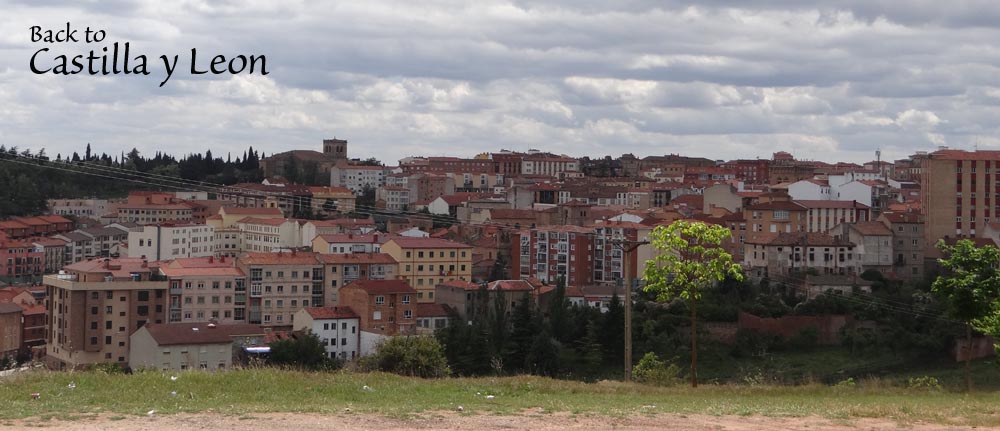 |
||||||||
|
Links: to Spain, by way of Windsor: 02 Rally Finish Onto Spain: 05 onto Leon 06 Astorga 08 to El Acebo
|
||||||||
|
Soria, Castile & Leon, 29 May, Thursday
We are back in the region of Castile & Leon, from where we started our Camino walk more than two weeks ago. Tonight, we are staying in one of the provincial capitals, Soria, after a day exploring an area which might, only might, have some relevance to me and my family history. |
||||||||
|
The story goes something like this: One of my great-great grandfathers was an Austrian, Felice Pobar. Felice (or Felix, as he became known), arrived in Australia around the time of the Victorian gold rush, early 1850s, and by his own account, was at the Eureka rebellion. Felice, and several generations of Pobars before him, had lived in a village called Volosco, then part of the Austrian empire, but which is now in Croatia. Pobar is an unusual name for Croatia, and one family story has it that for whatever reason, a few centuries ago, some of the Pobar family moved to that part of Austria on the Istrian Peninsula near the northern border with Italy, from Spain Yes, that's right, Spain. And coincidentally, or maybe not coincidentally, in Spain there is a village called Pobar. Now, this village is a few hundred kilometres north east of Madrid, but fortuitously, not too far off our route back to the capital from Bilbao. So, a slight detour was called for. Using the Spanish dictionary in Dave's phone, we wrote a message in my notepad, to show anyone we came across there asking if there were any people called Pobar still living there in the village of the same name. A good idea, but we hadn't thought far enough ahead - three people there read my note and launched into conversation - all in Spanish!!! So, we are none the wiser. It's quite a small village, with maybe 20 houses, most of them habitable but a few in ruins, plus a church far too big for the local people. It's surrounded by a rich agricultural area, with several other villages only short distances away, with a large-ish town, Soria, about 20 kilometres down the road. |
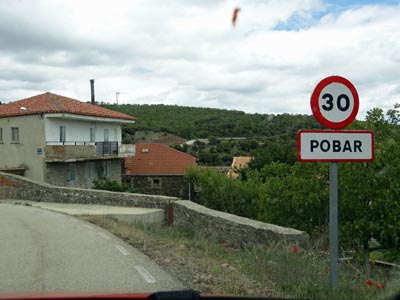
|
|||||||
|
above: our car in the village of Pobar right: our hotel in Soria |
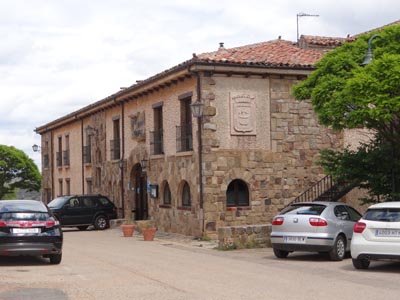 |
|||||||
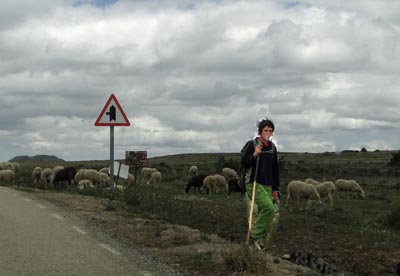
On our way to Pobar, we saw a way of life that has long disappeared from the Australian countryside - a young man, probably still a boy, minding a small flock of sheep. The young shepherd was holding a stick, and keeping his charges off the road, although apart from us, there was very little traffic. Our hotel tonight looks like it's been around for a while - stone walls, red roof tiles blackened with age, very comfortable, but with the usual Spanish hang-up of not serving dinner until 9pm. I know, when the Rome etc.... but ...I'm hungry at 7! and it appears there's no other food such as tapas, on offer here either. |
||||||||
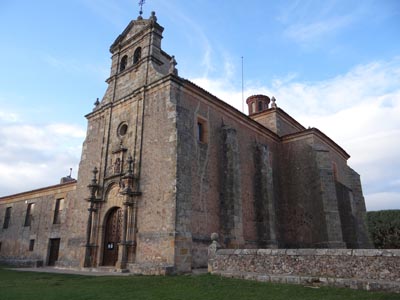 (later)
Filling in time before the 9pm dinner hour, we went for a
short stroll around the hotel the church across the road (there's
always a church across the road in Mediterranean country). We
didn't expect to be able to go in - generally, churches over here,
as in Australia, are closed when there is no service scheduled.
However, when we went up to the door, we could here singing -
choir practice, I thought, and pushed the door open. (later)
Filling in time before the 9pm dinner hour, we went for a
short stroll around the hotel the church across the road (there's
always a church across the road in Mediterranean country). We
didn't expect to be able to go in - generally, churches over here,
as in Australia, are closed when there is no service scheduled.
However, when we went up to the door, we could here singing -
choir practice, I thought, and pushed the door open.
The scene which greeted us took me by surprise. There was a priest in full vestments, with his back to what would have been a congregation if there had been any, and a young man, in what I thought was an acolyte's role. There was no spoken liturgy - it was all being sung in a language I didn't recognise, and I wondered if it was some form of worship following the old pre-1960s Latin rite. |
||||||||
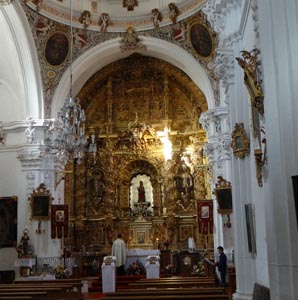
The priest explained to me after the service finished - although the church was Catholic, he and the young man were Romanian Orthodox, and they were allowed to use the church for their ritual. Obviously not a big number of Orthodox parishioners live here, so the lovely singing voice of the priest and his cantor went unappreciated except by a couple of bewildered Australian tourists.
Tomorrow, we drive to Madrid, and will stay at an airport hotel, before heading north, for a change of scene and of climate.... |
||||||||
